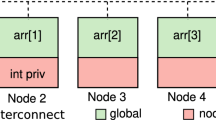Abstract
Due to advances in hardware architectures such as multi-core/multi-threaded architectures, various refinements of the parallel programming models such as distributed shared space, global address space and partitioned global address space (PGAS) etc., are widely prevalent in programming languages designed for high performance computing. In this paper, we shall discuss a preliminary work on a proof system for such a language. The language referred to as PGAS 0, is essentially an object-oriented language with features such as statically fixed set of places, asynchronous creation of activities, futures, atomics for synchronization etc. Many of the features of PGAS 0 are taken from the new experimental language X10 (built around Java) under design at IBM. The language distinguishes between local and remote data access with reference to threads. The atomic is the only construct that can be used for synchronization in PGAS 0 and is executed in a mutually exclusive manner at a place. One of the main safety properties of a PGAS 0 program is that a thread should not access non-local data object directly by dereferencing but use the construct future to obtain remote data. We shall describe the semantics of PGAS 0 and illustrate a proof system for the same with the motivation of establishing locality of data (an extremely useful from performance perspective). Further, we show how the same proof system can be used for establishing other concurrency properties.
Access this chapter
Tax calculation will be finalised at checkout
Purchases are for personal use only
Preview
Unable to display preview. Download preview PDF.
Similar content being viewed by others
References
Ábrahám, E., de Boer, F.S., de Roever, W.-P., Steffen, M.: An assertion based proof system for multithreaded java. TCS 331 (2005)
Agarwal, S., Barik, R., Nandivada, V.K., Shyamasundar, R.K., Varma, P.: Static detection of place locality and elimination of runtime checks. In: Ramalingam, G. (ed.) APLAS 2008. LNCS, vol. 5356, pp. 53–74. Springer, Heidelberg (2008)
Apt, K.R., Francez, N., de Roever, W.P.: A proof system for communicating sequential processes. ACM TOPLAS 2(3) (1980)
Charles, P., Donawa, C., Ebcioglu, K., Grothoff, C., Kielstra, A., von Praun, C., Saraswat, V., Sarkar, V.: X10: An object-oriented approach to non-uniform cluster computing. In: OOPSLA (2005)
de Boer, F.S., Clarke, D., Johnsen, E.B.: A complete guide to the future. In: De Nicola, R. (ed.) ESOP 2007. LNCS, vol. 4421, pp. 316–330. Springer, Heidelberg (2007)
Flanagan, C., Felleisen, M.: The semantics of future and an application. J. Funct. Program. 9(1) (1999)
Koymans, R., Shyamasundar, R.K., Gerth, R., de Roever, W.P., Arun-Kumar, S.: Compositional semantics for real-time distributed programming language. Information and Computation 79(3) (December 1988)
Kundaji, R.N., Shyamasundar, R.K.: Refinement calculus: A basis for translation, validation, debugging and certification. TCS 354 (2006)
Liblit, B., Aiken, A.: Type system for distributed data structures. In: POPL (2000)
Owicki, S., Gries, D.: An axiomatic proof technique for parallel programs. Acta Informatica 6(4) (1976)
Saraswat, V., Jagadeesan, R.: Concurrent clustered programming. In: Abadi, M., de Alfaro, L. (eds.) CONCUR 2005. LNCS, vol. 3653, pp. 353–367. Springer, Heidelberg (2005)
UPC language specifications, v1.2. Technical Report LBNL-59208, Berkeley National Lab. (2005)
Welc, A., Jagannathan, S., Hosking, A.: Safe futures for java. In: OOPSLA (2005)
Author information
Authors and Affiliations
Editor information
Editors and Affiliations
Rights and permissions
Copyright information
© 2010 Springer-Verlag Berlin Heidelberg
About this chapter
Cite this chapter
Agarwal, S., Shyamasundar, R.K. (2010). A Proof System for a PGAS Language. In: Dams, D., Hannemann, U., Steffen, M. (eds) Concurrency, Compositionality, and Correctness. Lecture Notes in Computer Science, vol 5930. Springer, Berlin, Heidelberg. https://doi.org/10.1007/978-3-642-11512-7_11
Download citation
DOI: https://doi.org/10.1007/978-3-642-11512-7_11
Publisher Name: Springer, Berlin, Heidelberg
Print ISBN: 978-3-642-11511-0
Online ISBN: 978-3-642-11512-7
eBook Packages: Computer ScienceComputer Science (R0)




